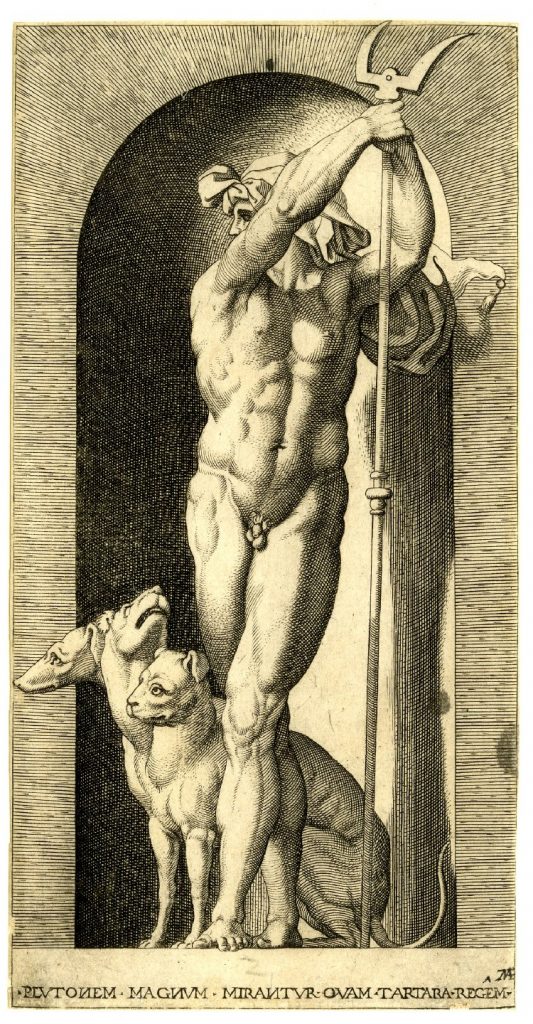More often than not, ancient Greek mythology (religion) served to explain a series of legends. Different from modern religions such as Christianity, Judaism, or Islam, ancient Greek religion was an anthropomorphic polytheism, meaning that ancient Greeks believed in a multitude of individual divine figures that took on human forms and emotions.1 Furthermore, ancient Greek mythology lacked much of the asceticism and mystical enthusiasm that is more commonly seen in modern religions. Most of the highly developed anthropomorphic and comparative rationalism of the ancient Greek religious thought can be accredited to Homer with the aid of his Iliad and Odyssey.2
The people of the ancient Greek civilization were often in a state of weakness under the power of nature; therefore, they relied heavily on the divine individuals of Olympus. Why? They believed that the forces of nature were under the control of their gods. In short, the relationship between humans and divine beings was that of a retribution justice.3 If humans did anything to offend the gods, then those gods would strike back in some sort of fashion to restore justice.4 Therefore, humans were constantly looking to please the gods in fear of their wrath.
Out of the ancient Greek mythology came the god of the dead and the underworld, Hades. Hades had five other siblings: Zeus, Poseidon, Demeter, Hera, and Hestia, and they were all children of Cronus and Rhea.5 After defeating their parents (the Titans), Hades drew lots with Zeus and Poseidon to gain their respective domains. Hades was commonly thought to be a cold god, but he was never considered to be an evil divine figure. Furthermore, it is important to note that his realm, the underworld, should not be associated with the hell of Christianity.6 However, Hades was for the most part feared by all. Another name for the ancient Greek god was Ploutos and later adopted by the Romans as Pluto.7

The god of the underworld was the husband of Persephone (Zeus’s and Demeter’s daughter). Although she was Hades’ wife, she only lived with him during the winter time.8 Persephone was the divine goddess of agriculture and fertility. Therefore, the ancient Greeks accredited the change in nature (winter) to Persephone moving to the underworld. Persephone was unable to stay with Hades at all times due to interference from her mother Demeter. Zeus, however, was okay with the marriage of Hades and Persephone. Therefore, in order to set up the marriage, Zeus had to trick Persephone, so she could be abducted by Hades.9 However, Demeter interfered, and that is why Persephone spends half of the year with Demeter and the other half with Hades.
Furthermore, it is important to note the Greek perspective of the afterlife. Perspectives about the afterlife varied from each other based on their region in Greece as well as their time period in Greek history. The consensus was that the underworld was neither heaven nor hell.10 The sense that exists within Christianity, for example, was not present during the time of the ancient Greeks. Although Tartarus was present as a location within the underworld, the Greeks would not compare it to the equivalent of Christian hell. The way the Greeks saw it, the underworld was a place that everyone ended up after death.11 However, there were a few, including the philosopher Epicurus, that believed that the underworld did not exist at all. He believed that when the body died, the soul died with the body as well.12 A good portion of Greeks refused to believe such a pessimistic perspective of the afterlife. However, even the Greek traditional perspective of the underworld was not as popular despite many Greeks believing in it.
- Funk & Wagnalls New World Encyclopedia, 2016 s.v., “Greek Religion and Mythology.” ↵
- Funk & Wagnalls New World Encyclopedia, 2016 s.v., “Greek Religion and Mythology.” ↵
- Funk & Wagnalls New World Encyclopedia, 2016 s.v., “Greek Religion and Mythology.” ↵
- Funk & Wagnalls New World Encyclopedia, 2016 s.v., “Greek Religion and Mythology.” ↵
- Salem Press Encyclopedia, January, 2015, “Hades (deity),” by Joseph, Michael, DMin. ↵
- Salem Press Encyclopedia, January, 2015, “Hades (deity),” by Joseph, Michael, DMin. ↵
- Salem Press Encyclopedia, January, 2015, “Hades (deity),” by Joseph, Michael, DMin. ↵
- Salem Press Encyclopedia, January, 2015, “Hades (deity),” by Joseph, Michael, DMin. ↵
- Salem Press Encyclopedia, January, 2015, “Hades (deity),” by Joseph, Michael, DMin. ↵
- The Greenhaven Encyclopedia of Ancient Greece, 2007, s.v. “Underworld,” by Robert B. Kebric. ↵
- The Greenhaven Encyclopedia of Ancient Greece, 2007, s.v. “Underworld,” by Robert B. Kebric. ↵
- The Greenhaven Encyclopedia of Ancient Greece, 2007, s.v. “Underworld,” by Robert B. Kebric. ↵



186 comments
Steven Hale
The explanation for winter is a little funny. I suppose without the scientific knowledge we have now ancient Greeks would have used myths to explain all kinds of natural phenomena. Growing up around Christianity, anthropomorphic polytheism is such a startling concept to me. It is hard for me to imagine so many divine figures, especially ones who are imperfect and have human tendencies.
Andrea Cabrera
My friends really got me into reading more about Greek and Roman Mythology. When I was in 10th grade our teacher have us an assignment to dress as a mythological creature and I decided to dress as Persephone and that is how I got more interested in her story and therefore Hades story too. It’s interesting and l feel the important detail of the article to remember that we shouldn’t associate Hades underworld to the Christian’s idea of hell.
Kaitlyn Killebrew
I love Roman and Egyptian mythology, but I have a special place in my heart for the Greek gods. When I was in elementary school our teacher had posters of each regions gods but the Greeks always seemed to catch my attention. It’s sad that this culture of polytheistic worship is rapidly declining. I will eventually find my way to Greece and Rome to visit all the temples of the gods. I love that this article put the time to mention that Hades realm is to not be affiliated with Christianity’s idea of hell, or that Zeus’s home was to be compared with Heaven. I wish this article had a bit more information on Hades and Persephone and how she was tricked to live in the Underworld and the reason why we have winter is because that is the time of year she stays with Hades, while spring is when she was allowed to walk the earth with the mortals.
Matthew Bustamante
Very informative article on Hades. As a roman Catholic I agree with the author that the doctrine of hell that the Catholic Church has today is not in equiveillance with what the ancient Greeks believed about the underworld. It was very interesting to know from a historical point of view what the ancient Greeks believed about their god Hades, his siblings, the drama of the myth, and its distinction from what Christianity believes about hell.
Diego Aguilera
I really enjoyed this article and the back story it provided with information about
Hades. It described how he is the god of the underworld but it shouldn’t be perceived as “hell”. That is something i didn’t know and i thought it was. I like the information it gives about his marriage and how strict the rules can be defending on your role. To read that these gods were worshipped so they weren’t strikes back upon is crazy to think about. Overall this article is great.
Janelle Larios
I have always appreciated Greek mythology and learning about it, but what I found most interesting about the article was the clear line drawn between the perception of Hades and the underworld through the eyes of Christianity and the perception of the Hades and the underworld through Greek mythology itself. The conception of Greek mythology is much older than the conception of Christianity, but because of Christianity and its worldwide following, little things like Hades and the underworld with its comparison to hell is very blurred. Which is understandable because we as humans try to understand things by comparing them to what we already know. Although in the article it is telling you that there is a difference in perception and that the underworld is unlike the imposing aura of hell, but that everyone dies and ends up there in the underworld. Its very intriguing indeed.
Luke Lopez
This article described the backstory behind how Hades was able to control the realm of the underworld. I did not know that the Greeks associated the change in seasons to Persephone going to the underworld. I also did not know that the underworld was not associated with heaven or hell. The Greeks believed that everyone went to the underworld after death.
Alyssa Garza
I’ve always enjoyed learning about Greek mythology just because there’s a god or goddess for different things and they all have unique characters. I had thought that all the Greek people believed in the underworld but I was wrong and it’s good to learn something new. I knew that Persephone was tricked into going to the underworld but I didn’t know that her father was apart of that plan. Hades is the god of death but in my eyes he’s the god of life because in life we all die but it’s a cycle we’re born and we live are lives only to die but there’s always someone to guide you to we’re your going.
Valeria Perez
Hades has always had a connotation of evil, but I liked how the article explained the whole backstory and the Greek’s attitude towards him. It was also interesting to see how ancient Greeks viewed death and the afterlife. In Christianity we view God as infallible but the Greeks saw them with human emotions and flaws, that is an interesting concept.
Michael Hinojosa
This article provides a more clear insight on the concept of death and the underworld in Greek mythology and how we need to see each and every mythology in its own lens rather than a lens somewhat dipped in christianity (something we’re used to). Hades and the Underworld are always commonly depicted as having some type of relationship with being evil in most forms of creative media like novels and video games and as such the view of these two concepts are always associated with things like the Christian Hell and Hades being an evil god, so being able to see the truth behind these stereotypes was insightful for me as I did associate Hades with being an evil being.